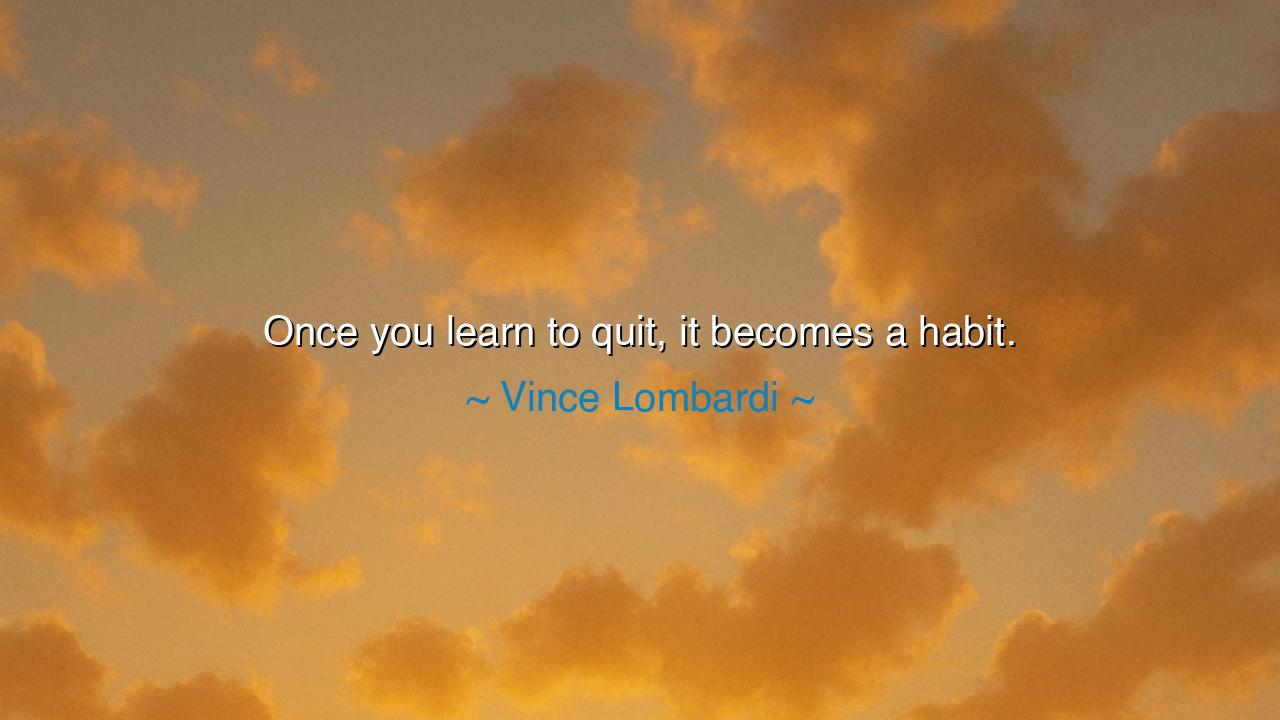
Once you learn to quit, it becomes a habit.






The legendary coach Vince Lombardi, a man whose words forged champions and whose spirit embodied perseverance, once declared: “Once you learn to quit, it becomes a habit.” In this single sentence, sharp as a blade and heavy as iron, Lombardi captured a truth as old as struggle itself—that the act of surrender, once embraced, takes root in the soul like a weed. Quitting is not merely an action; it is a habit of the heart, a surrender of will that, once learned, repeats itself with ease. Lombardi, who molded warriors on the field and leaders in life, understood that the greatest victories are not won against opponents, but against the whispering voice within that says, “Give up.”
To learn to quit is to train the mind toward weakness, to etch upon one’s spirit a pattern of retreat. The first time one yields to despair or fear, it feels temporary—a small thing, a relief from pain. But like water dripping upon stone, repetition shapes the character, wearing away resolve until the will grows soft. Lombardi’s warning is both stern and merciful: he tells us that each moment of surrender builds a chain, and that chain binds us, until quitting becomes not an exception but a way of life. The wise therefore guard their resolve as the warrior guards his sword, for once dulled, it cannot easily be restored.
In Lombardi’s world—the gridiron—this truth was not philosophy but reality. He coached men to fight through exhaustion, pain, and defeat, because he knew that every moment of resistance strengthened not just the body, but the soul. “Winners never quit, and quitters never win,” he often said, for he saw that perseverance was not a single act, but a habit as well. A man trained to push beyond his limits carries that power into all things—his work, his family, his dreams. But the one who quits, who allows comfort to outweigh conviction, will find that this too follows him, casting its shadow over every challenge.
History itself bears witness to this law. Consider Thomas Edison, who failed more than a thousand times in his pursuit of the electric light. When asked how he endured, he replied, “I have not failed. I’ve just found ten thousand ways that won’t work.” If he had quit at the first sign of difficulty, the world might have remained in darkness. Yet his perseverance became his greatest invention—the invention of the unbreakable will. For him, failure was not the end but the process, not defeat but education. And so he proved Lombardi’s truth in reverse: once you learn to endure, that too becomes a habit. Perseverance, like quitting, can take hold of the heart—but it leads to glory rather than regret.
Even the ancients spoke of this eternal struggle. The philosopher Aristotle wrote that excellence is not an act but a habit—that what we do repeatedly, we become. Courage, discipline, endurance—these are not gifts from the gods, but patterns carved into the soul through countless choices. Thus, every moment of hardship offers a sacred decision: to yield or to endure, to step back or to press forward. Lombardi’s words echo this ancient wisdom, calling us to vigilance over the habits we form in the crucible of difficulty. For it is not the great storms that destroy a man, but the slow erosion of his will through small acts of quitting.
To quit is human; even the strong falter. But to remain fallen, to make peace with failure, is the death of potential. Lombardi’s message is not one of condemnation, but of awakening. He reminds us that habits, once born, can be reshaped—that just as quitting can become a habit, so can endurance, discipline, and faith. The first victory, then, is the victory over self—the decision to rise one more time, to take one more step, even when every part of you screams for rest. In that moment, the soul is reforged in fire.
So, my child, let this be your lesson: beware the habit of quitting, for it disguises itself as comfort, yet it steals your strength. When the road grows hard, do not seek escape—seek growth. When failure strikes, do not curse it—learn from it. Each act of perseverance plants the seed of greatness, while each surrender teaches the heart to expect less of itself. If you must learn a habit, let it be the habit of enduring, of striving, of believing that within you lies more power than your fears would have you know.
And when the days come that test your resolve—and they will—remember the voice of Lombardi, echoing across generations: “Once you learn to quit, it becomes a habit.” But if you refuse to quit, if you rise each time you fall, then courage becomes your habit, faith your nature, and glory your destiny.






AAdministratorAdministrator
Welcome, honored guests. Please leave a comment, we will respond soon